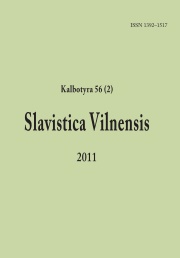Rusycyzmy w socjolekcie młodzieży polskiego pochodzenia w Wilnie
Russian Words in the Sociolect of the Young People of Polish Origin in Vilnius
Author(s): Miroslav DavlevičSubject(s): Lexis, Semantics, Comparative Linguistics, Sociolinguistics, Western Slavic Languages, Eastern Slavic Languages, Philology
Published by: Vilniaus Universiteto Leidykla
Summary/Abstract: A characteristic feature of the sociolect of the young people of Polish origin in Vilnius is the large number of borrowings from various languages. In the analyzed material different groups of words of foreign origin are distinguished. Borrowings from the Lithuanian, English, German, French and Italian languages are presented. However, the most prominent group - representing over 1/3 of the collected lexical data - are borrowings from the Russian language. This tendency is based on the long-term influence of the Russian language in these areas. Considering the subject of the borrowings as well as the level of adoption the following items are distinguished in this article: 1 Quotes: verbal and phraseological; 2 formal-semantic lexical borrowings (adopted words); 3 Semantic loanwords. In the majority of the cases these borrowings were taken over not from the literary language, but from the colloquial Russian language or Russian environmental dialects (e.g., criminal, youth slang, etc.) known as inter-sociolectic borrowings. Young people of Polish origin in Vilnius use sociolect, which is basically a mixture (mélange) of colloquial Russian, Russian criminal slang and Slavic expressive words (curse words and vulgar language). In a multilingual society the presence of lexical borrowings is an inevitable phenomenon. It is worth pointing out that in Lithuania (as well as on the territory of the former Soviet Union) the Russian language for a long period of time has performed the function of the interdialect.
Journal: Slavistica Vilnensis
- Issue Year: 56/2011
- Issue No: -
- Page Range: 67-76
- Page Count: 10
- Language: Polish

